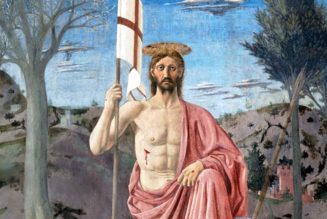Classical education is in a unique position to acknowledge in humility that every person is a sinner, and that some people and institutions in the West have been monstrously evil. Yet the Western heritage includes that which can never itself be complicit in evil: the true and the good, those inexhaustible resources that set us free.
 We have come to the beginning of strange new school year. In addition to the challenges of COVID-19, primary and secondary classical schools, colleges, and universities that provide a liberal education aimed at achieving wisdom and virtue, in part through an examination of the Western heritage, may find some students, parents, and outside observers asking whether they perpetuate racism. Some classical educators—bewildered at a world on fire in which figures of intellectual and artistic excellence or moral heroism like Aristotle, Winston Churchill, Damien of Molokai, Fredrick Douglass, Abraham Lincoln, Flannery O’Conner, and Walt Whitman are being attacked or preemptively defended—may ignore such questions due to confidence in the value of what they do. But, I believe that to ignore these questions is a serious mistake for students and the classical education movement.
We have come to the beginning of strange new school year. In addition to the challenges of COVID-19, primary and secondary classical schools, colleges, and universities that provide a liberal education aimed at achieving wisdom and virtue, in part through an examination of the Western heritage, may find some students, parents, and outside observers asking whether they perpetuate racism. Some classical educators—bewildered at a world on fire in which figures of intellectual and artistic excellence or moral heroism like Aristotle, Winston Churchill, Damien of Molokai, Fredrick Douglass, Abraham Lincoln, Flannery O’Conner, and Walt Whitman are being attacked or preemptively defended—may ignore such questions due to confidence in the value of what they do. But, I believe that to ignore these questions is a serious mistake for students and the classical education movement.
This summer’s broadening of an ongoing conversation about systemic racism in our nation was needed and long overdue, and it is reprehensible that it took the horrific killings of George Floyd and others to do it. If student concerns go unaddressed, many may later reflect back and conclude that their education’s unwillingness to have a dialogue about these matters was, at worst, a concealment of actual complicity in evil or, at best, a sign that classical education is hopelessly antiquated and hypocritical.
In an effort, then, to assist classical educators in responding to student and parent concerns, I here offer five different ways of talking about classical education in order to reveal what it is, or at least part of what it is not (i.e., not inherently racist and oppressive). While there is some overlap among the appeals, each offers something distinct. I order them below from simplest to the most complex.
The Honesty-Piety Appeal
First, classical education is honest and pious. It does not seek to turn a blind eye to the manifold injustices that are part of the Western story it teaches; it does not shy away from calling a false or evil idea–e.g. that “racially separate facilities are constitutional and good”–what it is. Moreover, it traces the historical consequences of such ideas. Moreover, classical education does a difficult thing: It balances this truth-telling with a cultivation of piety towards our intellectual, political, and familial ancestors, fallible sinners all. Such an education, then, can both condemn the slaveholding and hypocrisy of Thomas Jefferson while admiring his moving articulation of the principle that “all men are created equal.”
The Those-Who-Know-History Appeal
Secondly, classical education is sensitive to the past and inspiring for the present. Classical education offers its books (and subjects) to students as from a particular moment and as possessing sapience that transcends time or place,. Classical educators bring students to an encounter with a broad tradition of philosophic realism and—in the case of religious schools—a theism, while treating all great texts and traditions of thought with a measure of deference and humility. Such an approach equips students to understand this moment in the life of our nation. We can enter into dialogue and seek real and good change while remaining aware that injustice in society begins with injustice in the human heart and that injustice will never be wholly extirpated—although we must never cease the effort. This is the lesson of Aristotle, Augustine, and Solzhenitsyn. And lest this truth lead to complacency, the studies of a classical education provide the stories and principles that help order our emotions, imaginations, and intellects in such a manner as to stir up sadness and anger at contemporary racism; and these studies linger upon exemplary figures whose courage and zeal we can imitate as we seek to remove racism from individuals and institutions. For instance, students whose classical education has led them to encounter subtle-but-sympathetic portraits of the likes of David against Goliath, of Horatius at the bridge, of Joan of Arc at the stake, of William Wilberforce in Parliament, and of Dr. King in jail have been provided with many different images of courage which they can emulate.
The Via-Media Appeal
Third, while classical education has been painted as an extreme view opposing the moderate sensibilities of more common forms of pre-collegiate and university education, it is, in fact, a middle way between extremes. Take, for instance, canon formation and maintenance. Classical education is a tradition with principles upon which it forms a canon of great texts—including significant works that oppose (e.g., On the Genealogy of Morals) or that did not originate within (e.g., The Analects) said tradition. These principles allow classical educators to canonize the truly new book or author whose emergence—as T. S. Eliot knew—rearranges the relations of all the books in the canon. Also, in cases where, for example, racism has led to the wrongful omission of a past author or work, such principles allow us humbly to admit that such a work needs to be included. This approach finds a via media between voices that advocate either for a static body of works in a canon that cannot be adjusted or for having no list at all.
This middle way of classical education can be seen in many other spheres (pedagogy, school policy, etc.) in which all too often scholars and educators have abandoned one extreme in favor of another. Classical education, with an understanding of itself and its principles, is poised to avoid extremes and—as John Henry Newman put it in the context of a very different argument—to exercise with integrity and by its principles a power to assimilate what is true and good in ideas offered from one extreme or another. In short, classical education shows itself to be dynamic without being destructive. It studies the wisdom of the past in a way that challenges the too-tidy habits of mind into which we can fall in a given present, in a way that opens us to various expressions of the true and the good, and in a way that helps us make creative responses to the difficulties of our present day.
The Unique-Resources Appeal
Fourth, classical education provides unique resources by which to seek justice today without abandoning truth. Westerners enslaved black Africans and derived great wealth from the despicable practice. Some Western explorers and nations oppressed indigenous peoples. If the West includes Athens, Jerusalem, Rome, and the U.S.A., then Westerners killed Jesus and Socrates and Cicero and Boethius and Dr. King. This is something that a primary student can grasp. Nevertheless, it is Western heritage that provided and provides in its books, history, and disciplines the best human resources by which to critique such injustice and sin in order to bring about positive change. It is notable, if largely unknown, that a few early contemporaries of the slave trade, drawing on the Western resources of “the Christian prophetic tradition, scholastic theology, Roman and canon law, and ancient ethics” demanded that slavery be eliminated and all slaves emancipated and paid for their past labors. And, while such calls went largely unheeded, we need look no further than the civil rights movement to see a campaign in which Western principles and exemplars proved an indispensable part of the movement’s vitality and success.
For without the wisdom of Jesus’s view of the person, there is not Jefferson’s view in the Declaration; without the principles of the Declaration, there is not Lincoln’s commitment to a new birth of freedom. Dr. King not only invoked these three figures repeatedly, but also in his “Letter from Birmingham Jail” articulated his justification of civil disobedience on the principles of Augustine, Thomas Aquinas, Martin Buber, and Paul Tillich, and on the example of the three youths in the book of Daniel, the early Christians, Socrates, and the Boston Tea Party participants. Moreover, in his call for extreme, nonviolent action, he invoked the principles and/or witness of Paul, Martin Luther, and John Bunyan in addition to Jesus and the two aforementioned presidents. Western principles—like those that King drew upon—remain powerful resources from which we can address systemic injustice today, especially because these principles yoke justice with truth, and thereby are able to uphold the dignity of the oppressed and advocate for those who suffer discrimination.
The “Secondarity” Appeal
Fifth and finally, classical education and the Western heritage it teaches is not its own. The Western heritage traces to Athens and Jerusalem, but as Rémi Brague has shown, this binary misses the indispensable contribution of Rome to the Western or European culture that was spread, among other places, to the United States, making the U.S.A. part of the West as well. For Brague, Rome’s greatest contribution to the West is the manner in which it transmitted the Athenian and Jerusalemite heritages; namely, that it did so with a sense of its own “inferiority,” “dependency,” and “secondarity.” Even amidst its imperial ambitions, Rome is culturally a humble, largely unseen mediator that has made “possible the coexistence of the two cities” and their “productive tension” in the development of the European and American “West.” Rome indeed assimilated and at moments synthesized these two heritages, but Athens and Jerusalem remained always other to Rome. Athens and Jerusalem become the inexhaustible sources to which renaissance after renaissance recurred from the 6th century to the present. In this way, the West has avoided and can continue to avoid stagnation.
If Brague’s account is right, then classical education has much to learn from it. Lest those of us who are descended from Europeans smugly speak of the Western heritage as “ours,” we need to see that, in a certain respect, the very foundations of the Western heritage are not our own, but are “other” and a gift. Therefore, classical education can welcome the Western heritage, wonder at it, and learn from it without treating it as a commodity to be owned, used and—as infamously expressed in the approving metaphors of Machiavelli and Bacon—abused. Moreover, classical teachers can imitate Brague’s Rome by humbly laboring, almost unseen, to bring the treasures of the Western heritage to students in the hope that individual students will be formed in wisdom and virtue (and develop habits of receptivity and dialogue), and that classical education might itself become another one of the renaissance movements that goes back to Athens and Jerusalem to bring wisdom, reform, and renewal to a new time.
Conclusion
As we begin the semester, we have something to contribute to the needed, but difficult, conversation about systemic racism. Let us do so effectively and with humility. That is, let those of us involved at any level in the classical and liberal education that traces to Athens and Jerusalem be open to those students, parents, and others who question whether the Western heritage is essentially racist and in need of being toppled from its place in classical and, indeed, all education.
Classical education is in a unique position to acknowledge in humility that every person is a sinner and that some people and institutions in the West have been monstrously evil. Yet, the Western heritage includes that which can never itself be complicit in evil: the true and the good, those inexhaustible resources that set us free. Let us, therefore, with humble confidence set out to defend classical education without being defensive, to value the manner in which it can help us think about the challenges of our times, and to support it as it grows and matures as a renaissance of learning in wisdom and virtue for the twenty-first century.
The Imaginative Conservative applies the principle of appreciation to the discussion of culture and politics—we approach dialogue with magnanimity rather than with mere civility. Will you help us remain a refreshing oasis in the increasingly contentious arena of modern discourse? Please consider donating now.
The featured image is “The Education of Achilles by Auguste-Clément Chrétien” (1861). It is in the public domain, courtesy of Wikimedia Commons.









